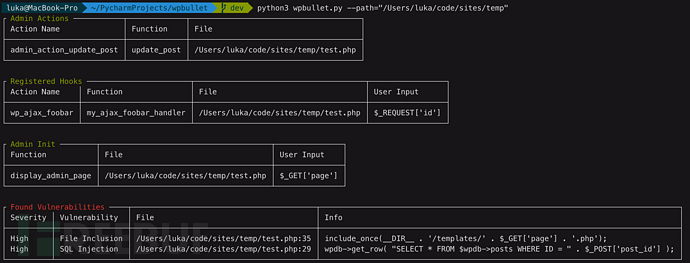Wpbullet:一款针对WordPress(PHP)的静态代码分析工具
作者:admin | 时间:2019-6-30 14:35:08 | 分类:黑客工具 隐藏侧边栏展开侧边栏
今天给大家介绍的是一款名叫Wpbullet的工具,广大安全研究人员可以使用这款工具来对WordPress、插件、主题以及其他PHP项目进行静态代码分析。

工具安装
大家可以直接从Wpbullet的GitHub代码库中将项目克隆至本地,然后安装工具的依赖组件,并运行工具脚本:
$ git clone https://github.com/webarx-security/wpbullet wpbullet
$ cd wpbullet
$ pip install -r requirements.txt
$ python wpbullet.py
工具使用
下面给出的是所有可用的操作选项:
–path(必需项) 系统路径或下载URL地址
使用样例:
--path="/path/to/plugin"
--path="https://wordpress.org/plugins/example-plugin"
--path="https://downloads.wordpress.org/plugin/example-plugin.1.5.zip"
–enabled(可选项) 检测给定的模块
使用样例:
--enabled="SQLInjection,CrossSiteScripting"–disabled(可选项) 不检测给定的模块
使用样例:
--disabled="SQLInjection,CrossSiteScripting"–cleanup(可选项) 在对远程下载的插件进行完扫描操作之后,自动删除本地.temp目录的内容
–report(可选项) 将分析结果以JSON格式数据存储至reports/目录中
$python wpbullet.py --path="/var/www/wp-content/plugins/plugin-name"创建模块
Wpbullet的模块可扩展性以及灵活性都非常高,它允许我们重写每一个模块的BaseClass方法并实现我们自己的方法。
Modules目录中的每一个模块都继承了core.modules.BaseClass类的属性以及方法,因此每一个模块都需要的参数就是BaseClass了。
创建完成之后,模块需要在modules/__init__.py中导入。模块名和类名必须保持一致,否则Wpbullet将无法正常加载。
如果你想要在本项目的GitHub上pull request的话,请附带模块的单元测试数据。
模块样本
Modules/ExampleVulnerability.py
from core.modules import BaseClass
class ExampleVulnerability(object):
# Vulnerability name
name= "Cross-site Scripting"
# Vulnerability severity
severity = "Low-Medium"
# Functions causing vulnerability
functions = [
"print"
"echo"
]
# Functions/regex that prevent exploitation
blacklist = [
"htmlspecialchars",
"esc_attr"
]
重写正则式匹配模式
正则式匹配模式由core.modules.BaseClass.build_pattern生成,因此我们可以根据自己的需要重写每一个模块类。
Modules/ExampleVulnerability.py
import copy
...
#Build dynamic regex pattern to locate vulnerabilities in given content
defbuild_pattern(self, content, file):
user_input = copy.deepcopy(self.user_input)
variables = self.get_input_variables(self,content)
if variables:
user_input.extend(variables)
if self.blacklist:
blacklist_pattern =r"(?!(\s?)+(.*(" + '|'.join(self.blacklist) + ")))"
else:
blacklist_pattern = ""
self.functions = [self.functions_prefix + xfor x in self.functions]
pattern = r"((" +'|'.join(self.functions) + ")\s{0,}\(?\s{0,1}" + blacklist_pattern +".*(" + '|'.join(user_input) + ").*)"
return pattern
模块单元测试
$ python3 -m unittest项目地址
Wpbullet:【GitHub传送门】
* 参考来源:webarx-security,FB小编Alpha_h4ck编译,转自FreeBuf
